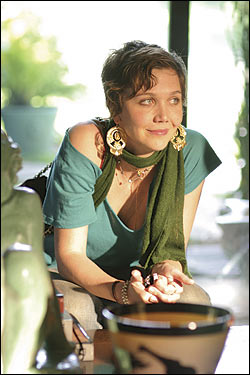“SEX! SEX!” bayed one tipsy young dish among the hundreds on Main Street in Park City, Utah, as Sundance Film Festivalgoers poured out of parties under the silver screen–like light of a full moon. She was apparently addressing no one in particular and the festival at large, and that’s about right: Short of the Oscars, there is no sexier event in filmdom. People who duck one another’s calls all year in Hollywood cram lemminglike together into screenings and restaurants with menus marked way up for the week, catching the erotic scent of fame from stars passing on the sidewalk—Naomi Watts, James Woods, Jared Leto, and Michael Keaton are among my early sightings—and raving about movies that they’d never watch back home. Here, they whip out their checkbooks and scribble huge sums—and that’s just for the sushi before the frenzied 4 a.m. seven-or-eight-figure distribution deal. At Sundance (which continues through Sunday, Jan. 30), everybody catches the buzz.
Four days into the fest, buzz kings include the pimp-turned-rapper flick Hustle and Flow, which earned producer John Singleton $9 million on his $3.5 mil investment; The Matador, a comedy starring Pierce Brosnan as a sleazebag hit man; Inside Deep Throat (which opens Feb. 11 in Seattle), Brian Grazer’s scrappily independent, full-frontal-nude documentary about the impact of Linda Lovelace’s fellatio epic on America; and, at a lower register, Mike Mills’ adaptation of Walter Kirn’s novel Thumbsucker.
But buzz is a fickle mistress: Word of mouth on one of Seattle’s two big flicks, Police Beat, is as furiously divergent as opinions on the Bush administration.
Though everyone at Sundance seems to concur on the Bushies: The usually bland-spoken Robert Redford bashed Bush in his festival opening speech and proposed moviemakers as part of the antidote to tyranny. “Artists are the first ones to rise up,” he claimed. Sundance turns 21 this year, which Redford calls “the age of dissent.”
Everybody I talked to dissented in fragmented ways on the movies I’ve seen so far—which don’t yet include any of the buzz flicks above. But all agreed about the lines, which were way crazier than 2004’s. “We came all the way from New Zealand and waited for three hours in the cold,” kvetched one couple at the thronged Entertainment Weekly party, “and we still couldn’t get into The Matador.” Even a sub-million-dollar, 20-day-shoot indie like Brick, a Dashiell Hammett noir set in a high school, inspired huge queues, which I hurdled thanks to a kindly publicist. But I was warned at the door: “If you have to go to the bathroom, you won’t be permitted back in.”
To me, Brick was worth the urinary tsuris. Though it begins like Bugsy Malone meets River’s Edge, a gimmicky flick with kids as drug gangsters uttering arch, artificial hard-boiled dialogue and contemplating a classmate dead in a drainage ditch, the complicated plot grows on you, and actually resolves itself. When did you last see a movie that got better as it went on?
Another polarizing picture was Happy Endings, a perverse comedy wherein Lisa Kudrow gives up the child she conceives with her gay stepbrother, which mixes her up with a blackmailer film student and a slinky gold digger (Maggie Gyllenhaal), who’s knocked up by the millionaire dad (Tom Arnold) of her gay boyfriend. “We’ve had a very busy year threatening the sanctity of marriage,” quipped writer- director Don Roos, dedicating the film to his boyfriend. “So many families to destroy, so little time!” At the film’s party, I learned that the stars did not know the director’s little stratagem in blocking the film: He arranged to have a physical obstacle—a countertop, a couch—between Arnold and his gay son in every scene until they reconcile over the son’s sexual identity. It’s a nice touch, and maybe if Arnold had known about it, he would’ve been too self-conscious to give the startlingly good performance he turns in.
At the Film Seattle party, the debate roiled around several questions: Will Police Beat sell, despite a sketchy plot? Who will replace outgoing Seattle film czar Donna James, and what will it mean that the office is now devoted to music as well as film? Will indie celeb director Guy Maddin (see Cowards Bend the Knee, p. 67) make the Northwest Film Forum a magnet for big stars and bigger money? And what will become of Soapdish director Michael Hoffman’s new Seattle-funded movie, Game 6, a paranoid Don DeLillo tale starring Michael Keaton and Robert Downey Jr. (now speaking to Hoffman again after an EW article of mine made him hate Hoffman for years)?
Stay tuned for next week’s comprehensive Sundance wrap-up. I’ve got to go stand in line—or find another friendly publicist.








